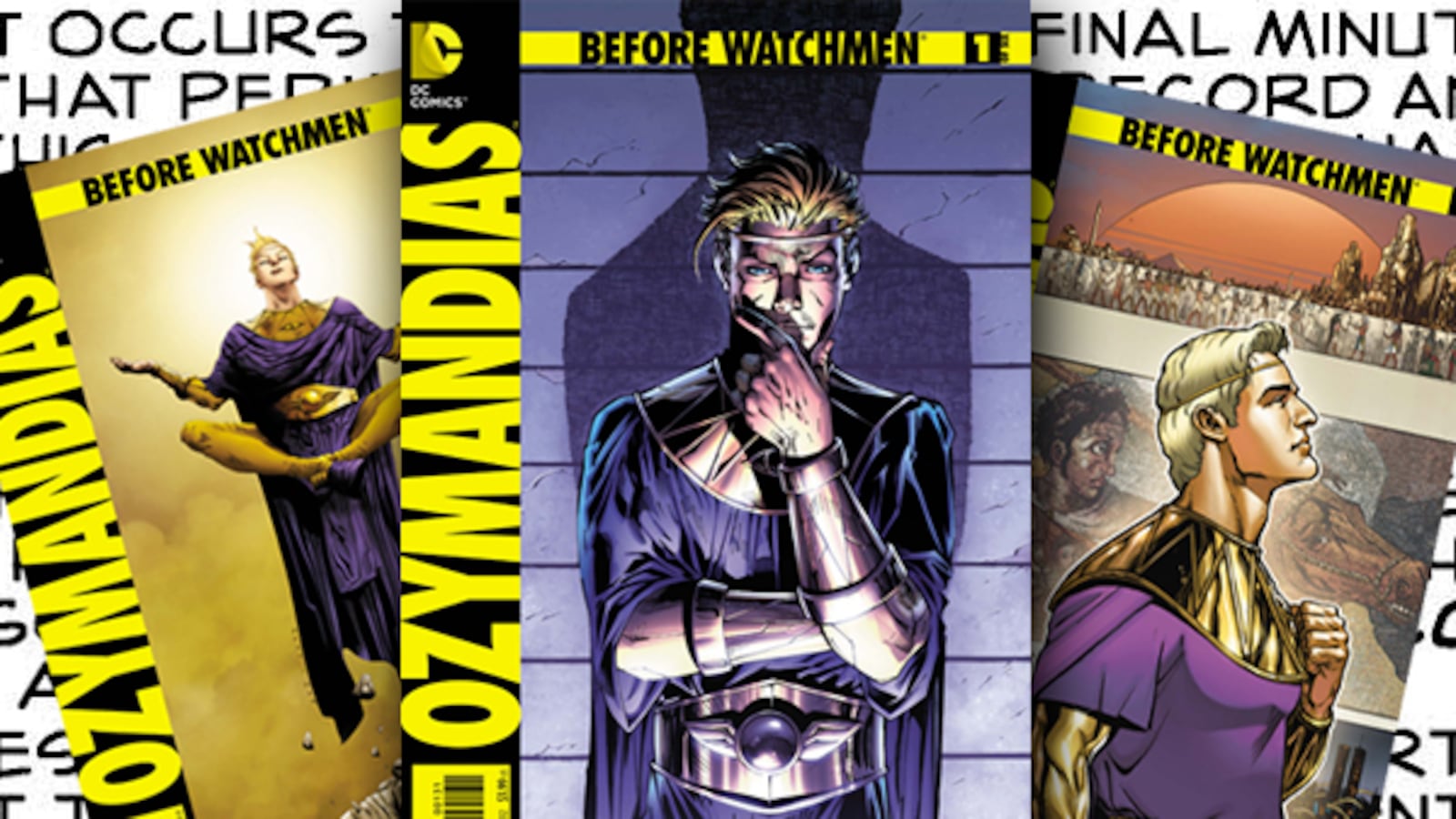If you’ve read anything about Raging Bull II, which I swear is actually being made, you know how pitiful a cash-in can seem. Now imagine Martin Scorsese vigorously denouncing it, while its producers go on about their intention to honor his vision.
This is, more or less exactly, going on in the comic book field right now, as DC Comics relaunches Watchmen, a famous comic story for people who don’t like comics.
Written by Alan Moore and featuring characters he and artist Dave Gibbons created, the comic first appeared in 1986 and eventually became the basis for an appalling 2009 movie. Now it’s become the raw meat feeding a shamboling zombie of prequel comics, Before Watchmen, which will triple the size of his original work and which Moore has called “completely shameless”.
Having no idea how this could happen, I ended up on the phone with Len Wein, who edited Watchmen, and as a writer helped create iconic superheroes Wolverine for Marvel and Swamp Thing for DC. Wein is writing two of the new Watchmen comics, including Ozymandias, which debuts tomorrow. I wouldn’t say he was yelling at me, but he was speaking with exclamation marks, which because he seems like a nice guy, I’d ascribe at least in part to occupational hazards.
“These are not shady business dealings!” he said. I had just told him that I thought an argument he was dismissing was really about shady business dealings.
They certainly strike the outside world as incredibly shady, I said.
“I’m sure Pam’s going to jump in here,” he said, “but I completely disagree with you!”
“And it’s not his place,” said Pam, “to talk about the business.”

Pam, who had arranged and was monitoring the call, works in some capacity for either DC Comics or its parent, DC Entertainment, a division of Warner Bros. whose mission, according to a press release from a few years ago, is “to fully realize the power and value of the DC Comics brand and characters across all media and platforms.” Warner Bros. is itself one of the many subsidiaries of Time Warner, which has annual revenues larger than the gross domestic product of about half of U.N. member states, which I mention because it suggests the scale of the vast unyielding drive for profit that has led to, among many more obviously horrible things, Before Watchmen. (I should also mention that I have happily cashed Time Warner checks.)
“Pardon?” I said.
“It’s not Len’s place to talk about the business!” said Pam. “He can really only talk about what he’s writing and what he’s doing with these characters now.” Which, fair enough.
As you may know, Watchmen was hailed as a classic of its form on its release in the mid-1980s, and has been read continually since. Partly an adolescent’s Ulysses or Citizen Kane (not just for the way it’s revered as a sacred text, but for the way that it’s as much about the development of its own form as anything else), and partly a satire ridiculing superheroes, its cast serves as stand-ins for characters from an obscure publishing company whose own heroes were off-brand equivalents of those at DC and Marvel. Much of the effect comes from the way Moore and Gibbons play with that: Mad right-wing adventurist The Comedian, for instance, is an obvious proxy for Captain America, and much of the initial appeal of the comic was in seeing an impotent Batman, a Superman using his powers with sexy results, and so on.
Ozymandias stands out as the least interesting of the comic’s six semi-titular leads, maybe because he wasn’t a natural fit. His original, Thunderbolt, was a throwback to the pulp magazines from which superheroes evolved, with an origin involving being raised in a Himalayan monastery, parents who died fighting the plague, ancient scrolls, “harnessing the unused portions of the brain,” and so on. Sensibly, Moore tossed all of this for Adrian Veidt, effete mutant genius and son of refugees from Hitler’s Europe. After possibly murdering his parents, he wanders the path of Alexander’s conquests, eats a ball of hash and realizes his destiny, which is apparently to train his mind and body to the peak of physical perfection so as to fight super-villains in the guise of Ozymandias, before retiring, becoming a wealthy industrialist and, in the series’ climax, killing half of New York with a fake telepathic squid in order to bring about world peace.
Moore hangs a lampshade on the ridiculousness of it all—Veidt, while wearing a purple-and-gold jumpsuit with a cape and tiara in his “Antarctic retreat,” rhetorically asks if he looks like a Republic serial villain—but Ozymandias, author of one of the most pointlessly intricate schemes in the history of pointlessly intricate supervillain schemes, is essentially a plot device. (“How much more fun can you have,” Wein asked, “than to be manipulating the guy manipulating the entire story?”)
It’s difficult to say anything definitive about how Wein is handling this nonexistent character without having read the full storyline (and because of the vague terms of the embargo my advance copy came with), though I will note that DC Entertainment and/or DC Comics has re-re-imagined Veidt’s sexuality, which may or may not be edgy and provocative. It is really a question of individual taste: either you think that the story of a man who kills millions of people with a fake telepathic squid is improved by the inclusion of details about how he was bullied as a child or not.
“The origin is there to fill in the story,” Wein said, “to help you understand who he is and why he does what he does.” Which, fair enough.
He had more to say about his vision for Moore’s character, but since DC felt it was important to have an embargo on the “news” here and a handler to keep the writer in line, I’ll leave it there.
Ozymandias is a good comic, taken as just a comic. Wein’s magniloquent style fits Veidt, and as a tale of boy’s adventure his story moves on its own terms, with knife fights on the Black Sea, visions of ancient gods and the like. Jae Lee, who draws and inks, is exceptional, using rounded, deceptively intricate panel layouts and figure work that in places calls to mind the Vienna Secession; I’d like to see Lee handle more of the familiar Watchmen characters. Everyone has done their job.
Still, you can’t judge a naked bit of product made over the violent objections of Moore, one of the two people with any moral if not legal right to control it, as just a comic. Moore says that he wrote Watchmen with the understanding that he owned it, that it turned out that he only owned it under certain conditions, that DC manipulated circumstances so that those conditions would never exist, and that he has spent the last 25 years turning down large amounts of money to write or at least bless something in the line of a prequel, sequel, or other new exploitation of the property.
He makes two basic arguments, both convincing. The first is that fully realizing the power and value of the Watchmen brand and characters requires leaving them alone. The story is powerful because it is complete, loved because it has integrity, and by now exhausted. Best to leave it all alone: This is an old comic, launched the year Lena Dunham was born, and any energy spent humping its corpse would be better spent on something that might be relevant to someone somewhere.
The second is that this is, if not legally then ethically, stolen property, and that to collude with a company whose annual revenues exceed the combined take of the NFL, MLB, NBA and NCAA plus the English Premier League against a writer living in the middle of England is wrong.
There seem to be two main sorts who reject both of these arguments. One is the kind of person who will go on in a movie theatre about the net participation in gross of the director and all the stars. This type is disproportionately represented among comics fans; he loves DC or Marvel, worries incessantly about their profits, and writes long, angry screeds in comment sections belittling Moore, one of the few significant talents to come from the superhero genre he loves. The other is someone directly employed in the making of Before Watchmen.
So, bringing this all back to Len Wein, I wasn’t surprised at his reaction when I asked for his thoughts on the fact that a lot of people would say Watchmen was just stolen from Moore and Gibbons (who, it should be noted, has tepidly endorsed the whole thing).
“A lot of people,” he said, “would be wrong.”
I asked if he could go into that a bit.
“They’ve stolen nothing from Alan and Dave,” he said. “A—the whole argument that, ‘We’ll give this back to you when it stops selling,’ and they’ve never given it back to them, is because it has never stopped selling. There is not one year of my own income—and my own income is considerable—where I would not trade that year off of what Alan simply made in back money off of the Watchmen.”
“We can’t really get into specifics, Tim,” said Pam.
Welcome to the logic bomb that is DC Entertainment, a cell in a vast body which in its booming voice declaims that if you swindle someone, it’s OK as long as you pay them their royalties, and that anyone who is making money off of something should be happy just to be making money from it, and to make more money from it if possible.
I ventured that even if his work wasn’t stolen, Moore seems to think it was, and wanted to know if it says something about solidarity among comic-book creators (a generally poorly paid and treated lot) that so many people were willing to work on this despite his objections.
“I think after 25 years,” said Wein, “some of the weight of Alan’s objections have lost weight.
“All of what we are doing we have offered him, and all we are doing he has turned down. We spent a quarter of a century offering him opportunities to do things with these characters, and he kept turning them down.”
Not wanting to be rude, slightly mystified by the implied statute of limitations on ethical actions, and intrigued by the idea that if you ask someone if you can do something for long enough you can eventually just do it without their assent, I moved into a more general line about whether telling the back stories of such deliberately vague characters might not remove a bit of their mystique.
“I think it’s a question of taste,” said Wein. “There are those who want to know more, and there are always those who want to know more. And there are those who just are happy with what they’ve got. The old argument, someone’s arguing constantly, what are we doing to his characters? How dare we do what we’re doing to his book? James M. Cain said, when asked about that exact same thing about [the movie versions of] his books like Double Indemnity and The Postman Always Rings Twice: ‘My books are on the shelf just the way I wrote them.’”
This is where I mentioned that the problem seemed to be more about shady business dealings than about Moore not wanting anyone else to play with his toys, which led to the declaration that Wein was not to talk about business, which led to a perfectly pleasant 10 minutes of comics talk and my sincere assurance that I looked forward to reading the rest of his Ozymandias comics, which I do, though I can’t imagine buying them because I am part of a generation that was raised to consider the minor consumer purchase to be an opportunity to act self-righteously.
There are worse things than Before Watchmen, and many better, like Fantagraphics’ new collection of Uncle Scrooge comics. Buy what won’t make you feel dirty.






